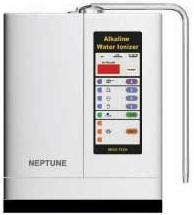 Affordable-Water-Ionizers.com
Affordable-Water-Ionizers.com
Affordable Nutrition For All
Lactase, Maltase, and Sucrase Enzymes
Rich Distributing Enzymes Plus Intestinal Flora
Ideally, the mucosal cells lining the small intestine secrete three digestive enzymes: sucrase, lactase and maltase. These enzymes, collectively known as disaccharidases, render dietary carbohydrates small enough to pass through the wall of the small intestine into the bloodstream to be used by the body as a source of energy for metabolic processes. Sucrase primarily digests sucrose (refined sugar) into glucose and fructose. Lactase digests lactose (milk sugar) into glucose and galactose. Maltase digests maltose, a product of starch digestion, into glucose. A deficiency of one or more of these disaccharide-splitting enzymes may be due to genetic influences, irritation or abnormality of the intestinal wall, and/or exhaustion of the body's ability to produce the enzyme(s). Disaccharidase deficiencies are generally charaterized by intestinal distress following ingestion of foods containing the ofending sugar or starch. Diarrhea is due to the increased number of un-split disaccharide molecules remaining in the intestinal lumen which are osmotically retaining fluid. Bloating and flatulence are caused by the production of gas (CO and H) from the bacterial fermentation of disaccharide residues in the lower small intestine and colon.
Lactase deficiency has received the most attention of the disaccharide - splitting enzyme deficiencies. Most mammals, including humans, have high intestinal lastase activity at birth. But, in some cases, this activity declines to low levels during childhood and remains low in sdulthood. The low lactase levels cause maldigestion of milk and other foods containing lactose. It is estimated that approx. 70% of the world's population is deficient in intestinal lactase with more that one-third of the U.S. population presumed to be unable to digest dairy products. Although not as well-recognized as lactase deficiencies, sucrase deficiencies may explain the increasing inability of many people to handle the sucrose in the modern, refined diet can exhaust the body's ability to produce sucrase enzymes as well as the body's supply of nutrients needed for carbohydrate metabolism. Chronic constipation in individuals consuming a highly refined carbohydrate diet may be at least partially explained by the absorption of excess sucrose into the bloodstream pulling water with it from the intestinal tract to maintain osmotic balance. Adding disaccharidase enzymes to the diets of those individuals suffering from a sucrase, lactase and/or maltase deficiency can help them more fully realize the nutritional benefits from carbohydrate containing foods.
The human digestive system does not secrete enzymes capable of breaking down cellulose, so dietary fiber moves through the digestive tract essentially intact unless the enzyme, is present in the diet. Cellulase deficiencies are often overlooked, yet a lack of cellulose can mean poor digestion of raw plant foods and less than optimal absorption of nutrients in the intestines. Cellulase digests cellulose into glucose and is naturally found in raw fruits, vegetables and whole grains. Many starches and other nutrients in these uncooked foods are coated with cellulose. Unfortunately, most people do not chew raw food thoroughly enough to activate the cellulose naturally present in the food. This means many nutrients in these foods are not released from the cellulose and, therefore, cannot be fully utilized by the body. In addition to improving intestinal absorption of nutrients, supplemental cellulose enzymes can enhance the boby's utilization of fiber to normalize bowel activity.
Many people who cannot tolerate carbohydrates in their turn to protein as their primary source of energy as 56% of protein intake i converted to glucose. Since high protein diets rarely contain the full spectrum of nutrients, many vitamins and minerals are depleted in the body's attempt to metabolize excessive amounts of protein resulting in multiple nutritional deficiencies.
The bottom line is that you need enzymes.
Return to Rich Distributing Enzymes Plus Intestinal Flora page
Other Enzyme Products
E3 Enzymes Supreme | Trevinol ES | Vitalzym | Enzyme Page
Important Enzyme Links
Systemic Enzymes
By
William Wong N.D., Ph.D.
Systemic Enzyme Explained by Landis Revin